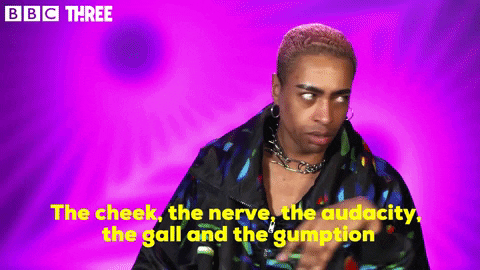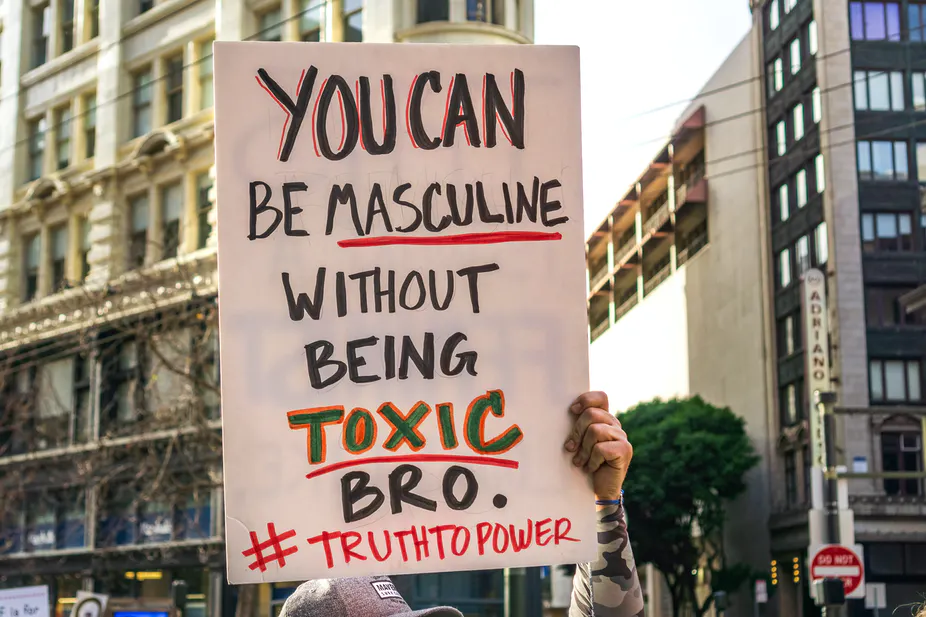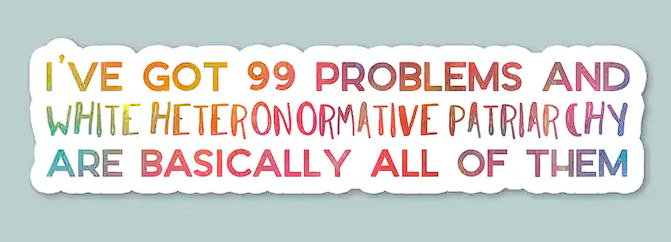The IT Industry Needs a Toxic Masculinity Intervention
I spend a great deal of time talking to people... it's one of the things I love the most about my line of work. I speak with people, get to know them, learn about them, and teach others about security and technology. But, while I get a lot out of this, there's one group of people I find incredibly draining to talk to: my corporate IT department.
Just yesterday, I found myself being responded to in all-caps chat from a senior leader of that department when trying to ask questions about process. "HOW CAN I BE CLEARER?!" was just one of the nice things he said while accusing me of trying to usurp him, subvert his authority, and so on. He was there to remind me that there was a pecking order in so many (aggressive) words. Hideous.

Same energy.
I respectfully declined to meet him at his level or attend his meetings where he could continue his abuse. Of course, this isn't the first time this group had exhibited this kind of toxic behavior, and I doubt it will be the last. Here's the shake: I could not shed the feeling of negativity about that day, and it followed me around through this weekend where I decided to write about it.
As a gay man with many years of experience in this industry, I instantly recognized this experience as one of toxic masculine behavior manifesting itself in the form of bullying. I've seen this throughout my career and increasingly so in roles of seniority. Assertive males in the workplace are beautifully summarized In Holly Althof's article detailing how Toxic Masculinity kills workplace culture published for SHRM, where she wrote:
"Toxic masculinity involves an ultra-competitive, dog-eat-dog work style that supports a patriarchal system designed to keep men on top. It encourages the mindset that outspoken men are assertive, while outspoken women are aggressive. Toxic masculinity is on display when men interrupt or talk over [people], take an inflexible attitude, and navigate the workplace like a battle zone to be conquered."
I'd argue there's a cultural epidemic in the IT industry, hurting all of us. This epidemic has manifested as a toxic masculinity problem. We need to tackle it head-on to create inclusive and diverse workplace cultures where people can productively collaborate.
A brief introduction to toxic masculinity

Yeah bro!
So, if you're not familiar, "Toxic Masculinity" is an umbrella term that encapsulates three related yet distinct concepts. The first refers to socially constructed norms and expectations of what it means to be a man. The second refers to culturally associated behaviors and practices that enforce these expectations. The third refers to how men are socialized into harmful versions of their gender. Toxic masculinity, in other words, describes masculine traits which are damaging to people regardless of gender. When we use terms like toxic or masculine interchangeably, we can perpetuate dangerous ideas about how all men act or behave, thus disregarding individuality and diverse experiences.
Toxic tech is burning out a burned-out workforce
It's not a stretch to conclude that technology workers are in high demand. Axios reporter Margaret McGill wrote last year that "Tech workers were in high demand pre-pandemic, and the COVID era's rapid moves to digital further intensified that need." 2021 alone saw around 1,200,000 openings for technology workers. Retention of skilled technology workers is crucial to the success of projects, business operations, and a competitive edge.
So it's not surprising that companies are willing to tolerate toxic cultures to retain hard-to-find talent. In 2017 the Kapor Center published their first-of-a-kind study on tech workers in which they surveyed 2,000 technology workers who left their jobs. Their studies found that a company culture like this created a sieve for underrepresented cultures. One person of color commented in the survey:
I was offended by the liberal use of stereotypes and the insistence on making a 'welcoming culture' that truly focused on only improving work life for a single demographic.
The study also found that these male-dominated cultures in tech resulted in 78% of the respondents were experiencing mistreatment. LGBTQ employees were the most likely to be bullied and experience public humiliation while at work. The study concluded that this toxic culture costs the industry 16 billion (with a B people!) dollars annually, even with conservative estimates.

Burning money like they're a supervillain in a fictional universe...
While retention of talent is a problem, so is developing promising talent. Burning out people means you lose not only some fantastic engineers but also everything they were capable of. The mental health impact alone could cause massive damage on an individual level and will most certainly drive valuable talent away from your company if it isn't dealt with. Honestly, couldn't we do better?
A Call to Action
If you've ever worked in a toxic workplace environment that tolerates and allows bullies and machoism, you know how soul-crushing it can be. Your work suffers, and your quality of life erodes. When leadership enables and fosters the culture by retaining toxic employees, it unnecessarily strains employees who are already stretched too thin by unreasonable workloads and demanding deadlines.
Let me be clear about my take on this: If any organization is actually serious and committed to overcoming obstacles like racism, inequality, and social justice, they need to develop a zero-tolerance policy for bullies and this kind of toxic culture —no matter how. Organizations must make it clear to the workforce that business, as usual, is no longer acceptable. Enable them to understand that if they witness or become targets of abuse, they will have support systems—and remedies—available to them. Everyone will need to be on board with this, and we'll need to confront this cultural problem together.
What you can do
If you're currently being bullied, harassed, or abused in your work life, then there are some basic steps you can (and should) take to protect yourself.
1. Learn how to identify toxic traits
Sometimes toxic people don't see themselves as bullies—they see their actions as playful or feel entitled to dominate others. Of course, whether or not a bullying situation is mainly subjective, but if someone feels privileged to be mean to you and doesn't seem motivated by anything other than power, you may need to take note.
2. Try to disengage
Like my conversation I mentioned in my open paragraph - the best thing to do here is to disengage. Refuse to submit to whims and pressure from the harassers. Giving them power over you provides them what they want. Refuse to do so.
3. Document the abusive behavior
Human resources will thank you later if you need to establish that you're being harassed. Document this at length. Save e-mails, copy chats, and abusive IM conversations. Establish that there's a pattern, and as you do, document how it is effecting people like you.
4. Talk to peers about how you feel
You're not alone, and your peers probably feel similar if they've had to deal with abusive coworkers. Talk to your peers, share how you think, and develop unified coping strategies that defuse these people.
5. Recognize your own shortcomings
Toxic masculinity much like toxic sludge has a way of getting in everything and rosining people once it's been spilled. Recognize and understand where you can better yourself and ask yourself if you're adopting the better parts of the company culture or the worst. Cheesy but true, change starts with you.
6. Keep your resume up to date
Life is far too short of putting up with prolonged periods of abuse. If you've tried to help improve company culture through self-advocation and don't have support from peers, or even worse, from HR, you need to remember something. In tech, there are a lot of opportunities. As previously outlined, 1,200,000 open jobs are waiting for you - and some of them are at companies with progressive cultures which might better align with your values.
So, in conclusion...

I really need this sticker for my laptop.
Maybe it might be silly or a bit on the nose to insist on smashing the patriarchy to solve this problem. But if you're reading this and feel alone, stressed, or even bullied... take heart, take a breath, and remember to be kind to yourself. You're not alone. We can change this, but we need to hold the line and change the situation. Without action nothing will change.
We got this.
-Marbaṩ
References
- How Toxic Masculinity Is Ruining Your Workplace Culture, by Holly Althof: How Toxic Masculinity Is Ruining Your Workplace Culture (shrm.org)
- Tech feels labor market crunch, by Margaret Harding McGill: Tech feels labor market crunch (axios.com)
- Kapor Center Report Leavers: KAPOR_Tech-Leavers-17-0428.pdf (kaporcenter.org)